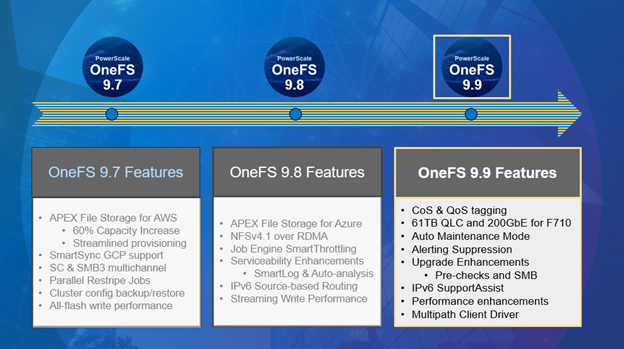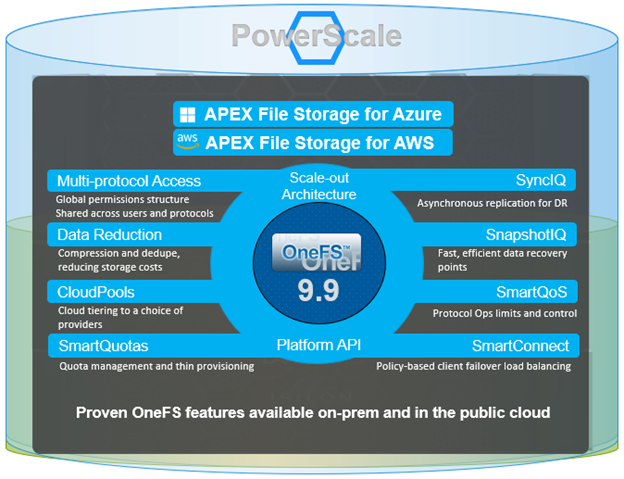Dell PowerScale is already powering up summer with the launch of the innovative OneFS 9.9 release, which shipped today (13th August 2024). This new 9.9 release is an all-rounder, introducing PowerScale innovations in performance, security, serviceability, protocols, and ease of use.

OneFS 9.9 delivers the next version of PowerScale’s common software platform for on-prem and cloud deployments. This can make it a solid fit for traditional file shares and home directories, vertical workloads like M&E, healthcare, life sciences, financial services, and next-gen AI, ML and analytics applications.

PowerScale’s scale-out architecture can be deployed on-site, in co-lo facilities, or as customer managed Amazon AWS and Microsoft Azure deployments, providing core to edge to cloud flexibility, plus the scale and performance and needed to run a variety of unstructured workflows on-prem or in the public cloud.
With data security, detection, and monitoring being top of mind in this era of unprecedented cyber threats, OneFS 9.9 brings an array of new features and functionality to keep your unstructured data and workloads more available, manageable, and secure than ever.
Monitoring and Alerting
On the monitoring and reporting front, OneFS 9.9 sees the debut of an automatic maintenance mode, allowing a maintenance window to be automatically triggered during an upgrade, node reboot, shutdown, or similarly disruptive event. In concert with this are the ‘noise reduction’ benefits provided by a new superfluous alerting and call-home suppression feature. Additionally, OneFS 9.9 also adds IPv6 networking support to its SupportAssist ‘phone home’ service.
Security
OneFS 9.9 now provides class of service (CoS) and quality of service (QoS) tagging via the introduction of Differentiated Service Code Point (DSCP) support within the OneFS firewall. This allows storage and network administrators to classify and separate network traffic, such as transactional data, management, bulk data, etc, in line with an organization’s security mandate and operational needs.
Upgrading
Non-disruptive cluster upgrades (NDU) get a boost in OneFS 9.9 from both enhanced SMB connection management and a new pre-upgrade health check system. The latter identifies potential issues before an upgrade can commence, improving the reliability and efficiency of system updates, and ensuring minimal disruption and optimal system performance post-upgrade.
Hardware Innovation
On the platform hardware front, OneFS 9.9 also unlocks dramatic performance and capacity enhancements – particularly for the all-flash F710, which sees the introduction of support for 61TB QLC SSDs, plus a 200Gb Ethernet backend network.
Performance
Performance is further boosted in OneFS 9.9 with the release of an NFS multipath client driver. For successful large-scale AI model customization and training, GPUs need data served to them quickly and efficiently. As such, compute and storage must be sized and deployed accordingly to eliminate potential bottlenecks in the infrastructure.
To meet this demand, the new multipath client driver enables performance aggregation of multiple PowerScale nodes through a single NFS mount point to one or many NFS clients, dramatically increasing the I/O to multiple PowerScale nodes through a single NFS mount point, for higher single-client throughput.
This can directly benefit generative AI and machine learning environments, plus other workloads involving highly concurrent streaming reads and writes of different files from individual, high throughput capable Linux servers. As such, the multipath client driver enables PowerScale to deliver the first Ethernet storage solution validated on the NVIDIA DGX SuperPOD.
In summary, OneFS 9.9 brings the following new features and functionality to the Dell PowerScale ecosystem:
| Feature | Info |
| Events and Alerts | · Automatic maintenance mode.
· Superfluous alerting suppression. |
| Upgrade | · NDU improved pre-upgrade healthchecks
· SMB disruption reduction. |
| Protocols | · Support for a multipath NFS driver for Linux client systems.
· Complete removal of deprecated SWIFT object protocol. |
| Networking | · Nvidia Spectrum-4 switch support for F710 200GbE.
· Support for in-field Ethernet adapter (NIC) swaps. |
| CoS / QoS Tagging | · Class of service and quality of service tagging enabled via the introduction of Differentiated Service Code Point (DSCP) support. |
| Platform | · Infrastructure support for 61TB QLC drives and a 200Gb/s back-end Ethernet network on the all-flash F710 platform. |
| Support | · IPv6 networking added for SupportAssist phone home service. |
Additionally, since S3 has become the de facto object protocol due to its extensive features, robust performance, and wide industry adoption, while the OpenStack community’s focus has shifted significantly, OneFS 9.9 sees the complete removal of the OpenStack Swift protocol & API. Swift will remain available and supported in OneFS 9.8 and earlier, until their respective end of support dates.
We’ll be taking a deeper look at OneFS 9.9’s new features and functionality in future blog articles over the course of the next few weeks.
Meanwhile, the new OneFS 9.9 code is available on the Dell Support site, as both an upgrade and reimage file, allowing both installation and upgrade of this new release.
For existing clusters running a prior OneFS release, the recommendation is to open a Service Request with to schedule an upgrade. To provide a consistent and positive upgrade experience, Dell EMC is offering assisted upgrades to OneFS 9.9 at no cost to customers with a valid support contract. Please refer to Knowledge Base article KB544296 for additional information on how to initiate the upgrade process.